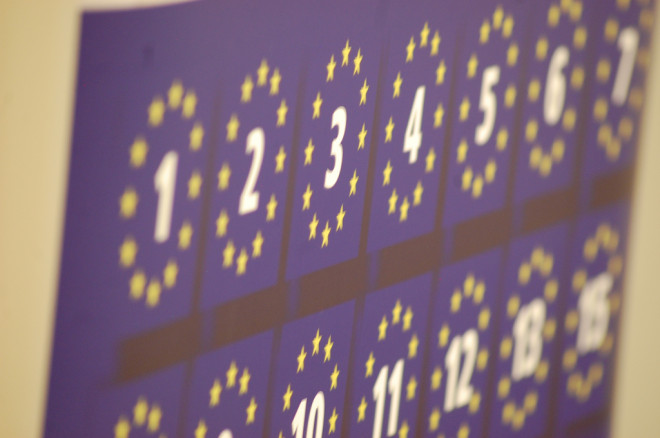
EuroVelo Workshops: A Successful Year & A Long Route Ahead
Without a doubt, 2011 has been a remarkable year for EuroVelo, the European cycle route network. Over the past 12 months 2 new routes have officially joined the network; the first dedicated EuroVelo website has gone live; there is a renewed network of National EuroVelo Coordination Centres and Coordinators; new manuals and guides have been published; there have been 3 route development projects along EuroVelo 13 – the Iron Curtain Trail; a separate one for EuroVelo 3 – the Pilgrims Route; and the ongoing EuroVelo 15 project – Demarrage – has started to bear fruits. ECF Policy officer for Cycling Tourism and Regional Policy, Ed Lancaster explains.
Over the course of three workshops in Brussels last week, we took the time to consider how the ambitious EuroVelo project should be developed further in the years to come. I can’t help but feel that cycling tourism is increasingly being taken seriously by people from outside the bicycle-friendly community. Planners, tourism experts, and even the European Parliament view cycling tourism as an essential form of sustainable tourism.
As proof of EuroVelo’s growing support, we even had Mrs Katarzyna Sobierajska, Undersecretary of State, Ministry of Sport and Tourism of the Republic of Poland attend the ECF hosted workshops. There were also presentations from other movers and shakers, including Mr Pedro Ortún, (Director of DG ENTR (the EU body responsible for enterprise and industry) and Wolfgang Münch, Policy Officer from DG REGIO (responsible for regional policy)
Mrs Sobierajska described the EuroVelo network as “an excellent instrument for promoting cycling as an economically, environmentally and socially sustainable means of transport, and provides excellent infrastructure for active pro-environmental recreation.” She also called for steps to be taken to implement the European Parliament's resolution of 22 April 2009 asking the European Commission and Member States to consider including EuroVelo routes into the TEN-T network.
The real headline-grabber when it comes to cycling tourism is undeniably economics. Mr Ortún, spoke of EuroVelo’s economic impact and argued that the network could be an important tool in increasing tourism opportunities across Europe. What interested him is EuroVelo’s ability to extend the high season of tourism. In other words, if you get more people to destinations in the off season, you’ll have more people employed, and smooth out of some the nastier cyclical effects of seasonal employment.
So now, it’s not really a question of whether or not we should create a network of bicycle paths, but rather how do we get it done?
One of the big questions which comes to mind is how much will this network cost. Let’s be honest: it’s not going to be cheap to build a European cycle route network that links places as far away as Moscow and the Algarve. EuroVelo Manager, Adam Bodor, pins the bill somewhere between 1.5-2 billion Euros to complete the network by 2020. These figures do however take into account not just route development but also coordination and promotion.
But that being said this is a small price to pay for such a high return. A study commissioned by the European Parliament in 2009, estimated that its economic impact would be 5 billion Euros per year once it is complete.
[gallery]
Other talking points
A second workshop focused on EuroVelo 13 – the Iron Curtain Trail. This trail has been the brain child of MEP Michael Cramer, and traces the former “iron curtain” which divided Europe for almost half a century. Cramer gave a rousing speech, encouraging everyone to build on the successes of the past year and ensure that the route realises its potential.
The Danes being such a cycle friendly nation also allowed us to have one of our workshops at their embassy. Much was said about EuroVelo 3 – The Pilgrims Route, which passes through Denmark and Klaus Bondam, Director at the Danish Cultural Institute/Benelux and the former Mayor of Copenhagen (widely known as the ‘Cycling Mayor’) had more than a few words to day. Mr Bondam encouraged those working on the routes not just to promote them as tourism products but also to emphasise their value to local communities along the routes, as a sustainable transportation network.
These workshops were a suitable end to what has been a busy year for EuroVelo. Thanks to grants from DG ENTR, several EuroVelo-related projects have enabled the development of an improved EuroVelo central coordination, as well as the specific route development projects linked to EuroVelo 3 and 13. The ECF is hoping for more of the same in 2012.
For more information on the workshops (including pdfs of the presentations) or for information related to EuroVelo in general, please visit www.EuroVelo.org.
Ed Lancaster, ECF Policy Officer forRegional Policy & Cycling Tourism -For the past 7 years, Ed has worked as a Town Planner for various local authorities in South East England and he has a Master’s degree in Town Planning from the University of Westminster. In his last role he was responsible for transport policies and strategy, as well as managing numerous cycling-related projects (e.g. providing new cycle infrastructure and running promotional activities).
Contact the author
Recent news!
Upcoming events
Contact Us
Avenue des Arts, 7-8
Postal address: Rue de la Charité, 22
1210 Brussels, Belgium











